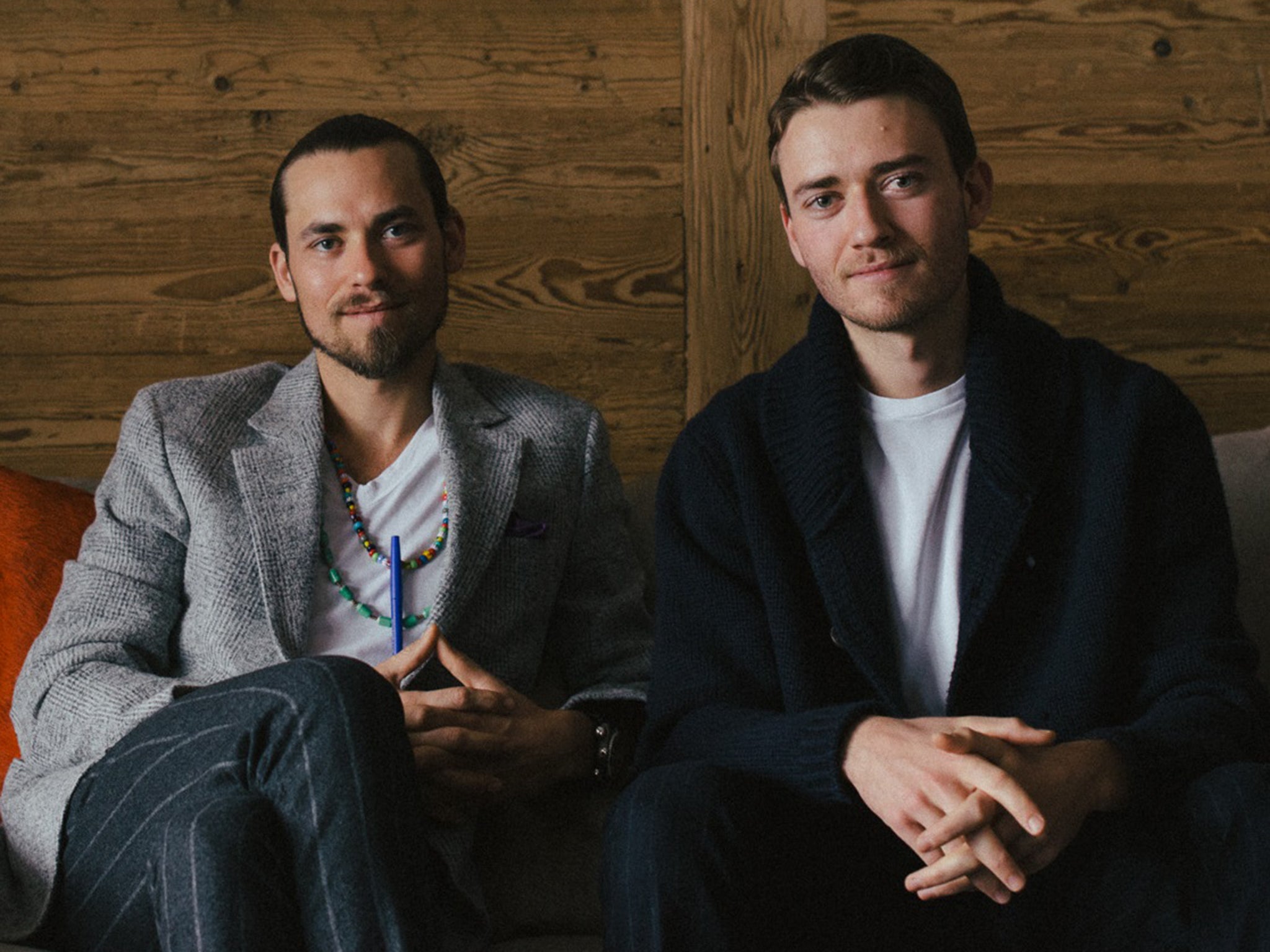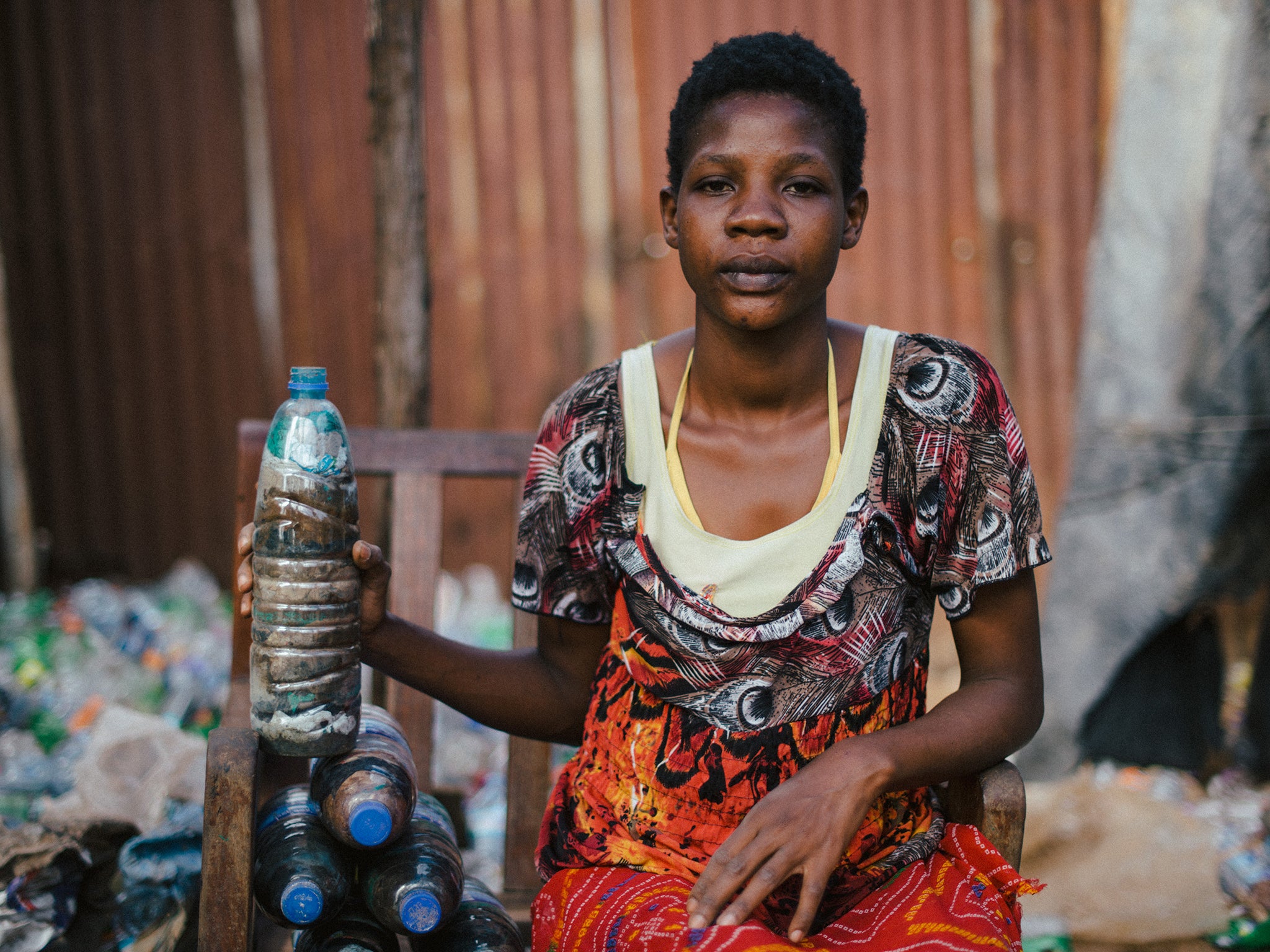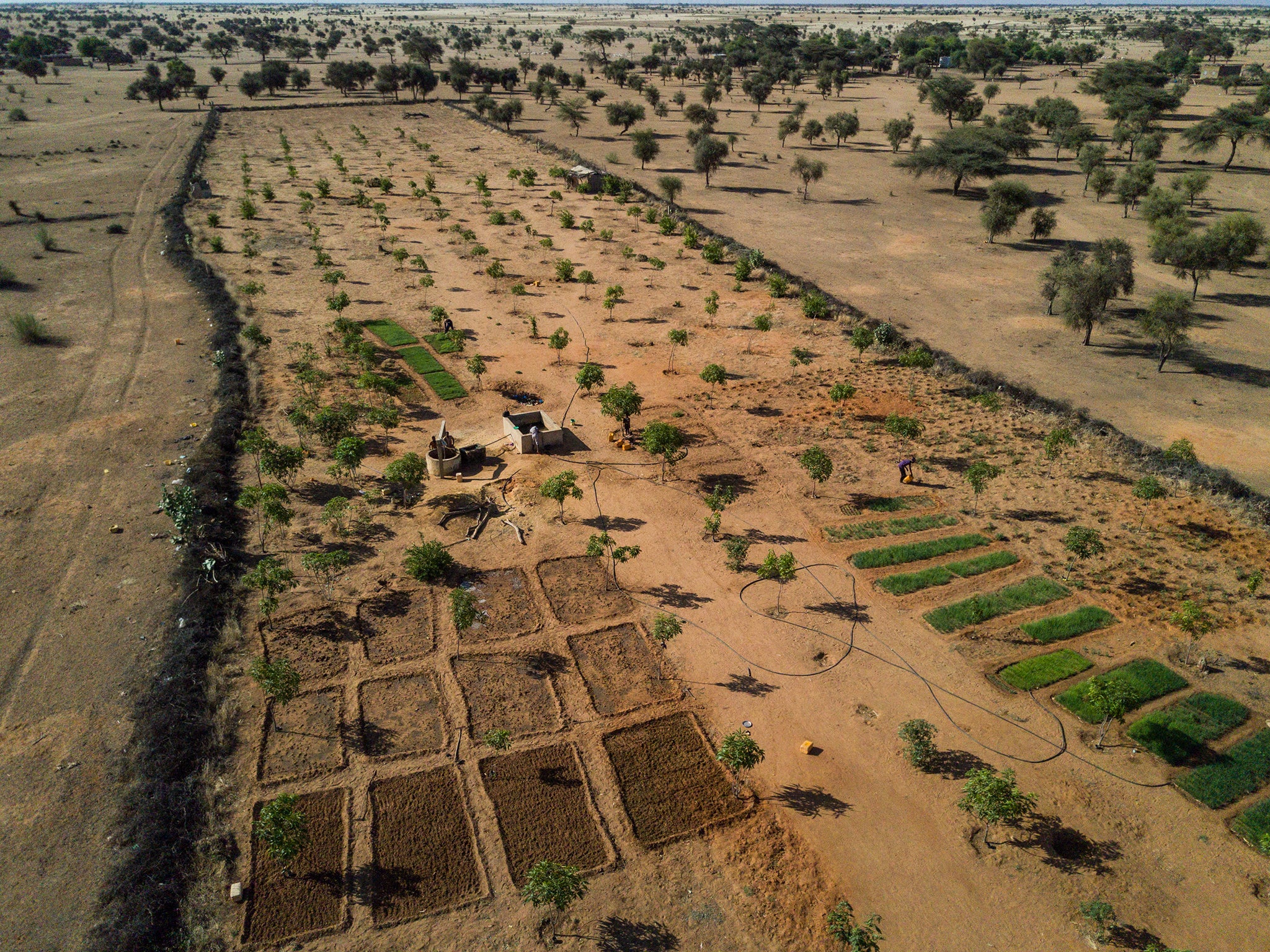‘This is the decade that matters’: The brothers investing in vital projects to heal the world
They know they can’t change everything, but Andy Martin speaks with the Mimrans, who will try their best through their three-pronged entrepreneurship venture TO.org


I have to go and sit in a drafty old ice cream van to speak with the Mimran brothers, Arieh and Nachson, about To.org. Admittedly, the van is parked right outside of a palatial five-star hotel, the Alpina, their mountainside office in Gstaad, with a very nice view from the top – of several summits smothered with snow.
To.org, which they co-founded, comprises the initial letters of the Hebrew phrase, Tikkun olam – “repair the world”. But it’s also half the infinitive in English, drawing attention to their role as enablers, making it possible “to” do things. And finally, it stresses To-getherness, the tight bond between the two brothers themselves, and their ideal of global fraternity.
In a way, it was their mother, Debra, who kickstarted To. She would ask them every day as they were growing up: “Have you been the best you can be today?” Then she died suddenly, in 2013, at the age of 54, when she was thrown from her horse while riding in Patagonia. They rushed to her side, and made a deathbed vow to try to live up to their mother’s high expectations. I reckon she’d be proud of them.
The Mimrans are hard to categorise. They are altruistic entrepreneurs with a communist streak, on the verge of what might be the first practical and non-coercive application of the Marxian principle, “From each according to their ability, to each according to their need.” They are climate activist-investors with a rock star vibe. They think of themselves as “collaborators” or “solutionists”, but I see them as more like modern muses in the age of the anthropocene who go about inspiring and encouraging. They’ve got so many projects on the go they seem like maestros conducting a worldwide orchestra.
They are contrasting but complementary characters. Nachson, now 31, CEO of To.org, is the fun-loving visionary, with four young children of his own. “When I was growing up the only thing I was serious about was not being serious,” he says. “I couldn’t even figure out why I was studying.” Arieh, at 24, as befits a Chief Investment Officer, is the more quantitative and scholarly of the two, with a head for figures and equations and a degree from Princeton. “I was a very serious kid,” he says, recalling that from the age of five he was worried about being “net positive” and if anyone gave him anything he would ask himself, “Do I really deserve that?”
Their mother’s premature death served to concentrate their minds and brought them together as partners. “Everybody has a plan till you get punched in the nose,” says Nachson. “She inspired us. The realisation of mortality gives you this sense of urgency.” Arieh nods in agreement. “We want to bring meaning to what we do – but be smart about it.” In other words, they are all about ethical or “conscious” capitalism: they are doing good things with their money, and still managing to turn a profit. They have a heart, but their heads are screwed on. “Money can be good,” they argue and have backed a bank in the US explicitly called Good Money – which is owned by its customers.
If you could start all over again from scratch, maybe you wouldn’t want to invent capitalism. But this is where we are and this is what we have to work with
Nachson, who pops up in some of their short films, looks a bit like a younger, less piratical Johnny Depp. “If you could start all over again from scratch,” he says, “maybe you wouldn’t want to invent capitalism. But this is where we are and this is what we have to work with.” The brothers were both born in Geneva and brought up in part in Senegal and Cote d’Ivoire, west Africa, where their father, Jean-Claude, had a sugar-cane business. They speak French with a Senegalese spin and their HQ is in Senegal.
They want to know if I know that whales are brilliant at sequestering carbon (I admit I have no idea). “Everyone talks about trees,” says Nachson, “but whales are just as important – for algae and therefore oxygen.” Their “Together-band” (buy one/donate one) comes in 17 different colours to draw attention to the 17 UN sustainable development goals. Nachson wears one on his wrist. “Every time I pick up a pen I remember I’m fighting for zero poverty.” Their fundamental goal is to turn human beings from a problem into a solution. They want to “disrupt the status quo”, but at the same time they don’t want to “kill the incumbents”.

Both of them hate and despise single-use plastic: “It’s so uncool now to sip on a plastic straw in a nightclub,” says Nachson. Sitting in their van, they don’t offer me an ice cream but they do show me one of their “bottle bricks”. Stuffed with about fifty plastic bags, it’s rock solid. They used them to build another van in Uganda, just like this one, and a bunch of compost-producing latrines. I should explain about the van, the so-called “Shadowman van”. Tagged with black acrylic silhouettes by American artist Richard Hambleton, they have turned it into a communications hub that enables them to hook up with similar vehicles (or vehicle-shaped constructions) parked in far-flung places in Uganda and Bangladesh.
The Mimrans are keen to escape from the “bubble” of white European privilege. Nachson has recently returned from a Rohingya Muslim refugee camp in Bangladesh, where he was setting up an FM station. He questions the “pursuit of happiness” part of the American constitution. “On its own, it’s not enough. You lose yourself in happiness when you’re helping others. If an action can heal the world then it can heal you too.”
Arieh, even though he is the one doing the sums, reckons that “feelings” have to get into the equation somewhere. He considers that one reason people are so unhappy, or feel “alienated”, is because they have been relegated to the role of consumer: “It stimulates the economy, but it’s not enough. You ask yourself: is that all I’m here for – to consume?” He thinks that everyone needs some kind of purpose, or “intentional output”. By the same token, he prefers to read “impact-weighted financial reports” that incorporate social and environmental consequences: “We’re having a hard time pricing carbon – it’s four times less than it should be.”
All their efforts are dedicated towards reversing climate change. If we keep going at the current rate, according to the En-Roads simulator (from the Massachusetts Institute of Technology), the global temperature will rise by over 4C within 100 years. Getting it down to a mere 1.5C is going to be huge. “This is the decade that matters,” says Nachson. He notes that, according to UN figures, we have brought down “extreme poverty” from 30 per cent to more like 10 per cent. “Fear is not the motivating factor. Or hope. If you can show the progress we have made, then we have a window of opportunity.” They are involved in trying to build the “Great Green Wall” across Africa, planting trees from Senegal to Eritrea. But everyone can do their bit, Nachson reckons. “You’re voting with your fork and the clothes on your back. If you’re a musician, sing and write lyrics that are a bit more inspirational.”

There are three main strands to their organisation: “Venture” (investing in sound business propositions with the emphasis on repairing), “Create” (design, branding, communications), and finally “Foundation” (more explicitly philanthropic). They argue that most social and environmental problems can be solved with a good business model. But you also want to do things in environments – such as refugee camps – where markets can’t function. “It’s important that philanthropy doesn’t crowd out private initiative,” says Arieh. “For example, if you’re giving out free hats in a place where there are people making and selling hats, then you’re killing them.”
Some of the businesses they have been involved in combine these different approaches. “L”, for example, markets vegan condoms to women: you buy one and one is donated to women in developing countries. “No reason why women should not be into condoms,” says Nachson. “They pay a higher price.”
If you’re giving out free hats in a place where there are people making and selling hats, then you’re killing them.
They have a fondness for businesses that shift the zeitgeist, what they call “culture-hacking”. “Beyond Meat has changed the way we look at meat.” On the other hand, they are careful about just exchanging new lamps for old. Nachson points out: “Even the old-school luxury brands don’t want to use real fur any more. Which is progress.” But he also adds: “If we’re going to use polymer-based fake fur that leaks chemicals into the waterways, this may not be the solution.”
He was undecided about replacing his old diesel car for a new electric one. “Would it actually be better for the environment?” The cost of getting rid of the old one would have to be factored in and might in the short term outweigh the gain from the reduction in emissions. “In the end I bought an electric car on an emotional basis.”
His point is that “You can’t just change everything”. In this respect the brothers sound a different note to, say, Extinction Rebellion. “You can’t just pull out all your assets from gas and oil,” chimes in Arieh.”You’d cause a recession. It’s all about gradual transitions.”
They are wary of good intentions that have not been fully quantified. I’m the one who’s supposed to be asking them the questions, but half the time they are asking me. “Which is more sustainable – a T-shirt made of algae that you can feed to the worms? Or one made of kevlar – which you would never have to replace?” The considered answer to this one leads them to back a company like Vollebak who make indestructible puffer jackets, filled with plastic instead of goose-down. “If you use it for long enough you are amortizing the investment,” says Arieh.
The same logic goes into Adidas shoes made out of plastic picked up off the beaches of the Maldives. “But the shoes have to sell themselves on the basis of price and quality and comfort. And you’re saving a turtle at the same time.”
One question they ask to which none of us has an answer is, “Why does Kim Kardashian have such power?” I can’t help wondering about the five-star hotel, though. I mean, I get the business with the van, but why the hotel too? The brothers patiently explain their thinking. The point is that the place, being so massively expensive, tends to attract the kind of powerful people who go to Davos regularly, captains of industry and oligarchs, so it provides a context in which to exert a subtle influence on the elite. For example, all the clothes hooks around the Alpina are in the form of wolves’ heads and in the foyer, Nachson shows me, are the claws that used to belong to Wolverine (of X-Men fame) which came from Leonardo di Caprio, who got them from Hugh Jackman himself. “We want to ‘nudge’ them to think about rewilding.
Once upon a time, Arieh and Nachson Mimran would have been wealthy playboys, jet-setting around the world from one fur-lined hedonistic experience to another. But the “me” generation is over: the brothers are part of generation “we”, socially and environmentally aware, concerned about the fate of the planet and all its occupants, from the lowest to the highest, human and non-human, conscious of the web of connections between them. I think this is what Nachson means when he says, “We’re equal, whether you are living in a 5-star hotel or a refugee camp.”
We’re equal, whether you are living in a five-star hotel or a refugee camp.
Even surfers – those great outsider figures – are included. Surfers have long been exercised by a contradiction at the core of what they do: on the one hand, they are in tune with the rhythms of the seas, the wind and the moon; on the other, they are riding waves on a piece of plastic, engineered using toxic chemicals, liable to cause pollution. The Mimran brothers are fixing that too: they have come up with a biodegradable surfboard made out of seaweed. And another one made out of re-cycled flotsam.
Arieh and Nachson are more like surfers, keeping watch on the state of the ocean, than traditional entrepreneurs. When they look at the “outputs” of their various projects, they have a long list of criteria, social, environmental, educational, and inspirational. They are not indifferent to matters of finance, but they ultimately put the emphasis on what they call a “spiritual return”. Nachson looks me in the eye. “We have to ask ourselves – if one day we had the opportunity to contemplate what we had done – would we be proud of it?”
Join our commenting forum
Join thought-provoking conversations, follow other Independent readers and see their replies
Comments